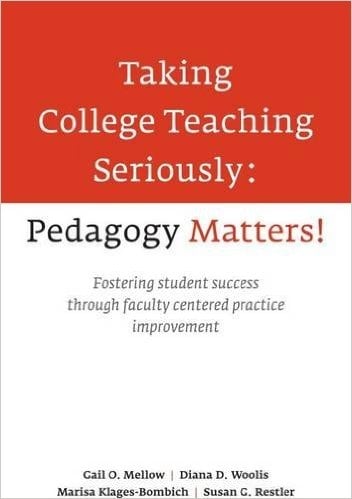You have /5 articles left.
Sign up for a free account or log in.

Amazon
The call to increase the number of U.S. adults with college degrees and improve college completion rates across the country has only grown louder in recent years.
But relatively little has been discussed about the actual teaching that occurs inside the thousands of lecture halls, labs and classrooms on college campuses. Now a new book by Gail O. Mellow, president of LaGuardia Community College of the City University of New York; Marisa Klages-Bombich, a professor at LaGuardia; and Knowledge in the Public Interest founders Diana D. Woolis and Susan G. Restler examines why the methods and development behind college teaching are important to boosting completion rates. Taking College Teaching Seriously: Pedagogy Matters! (Stylus Publishing, LLC) presents a "practice improvement model" to help faculty examine their teaching practices and -- with the help of technology -- focus on improvement.
Similar themes will be the subject of a conference Monday at LaGuardia.
Taking College Teaching Seriously uses multiple examples from professors to explain how they improved their pedagogy by documenting challenges and developing their strategies to overcome them. One of the authors, Mellow, responded to question about the book in an email interview.
Q: What are some problems with the current view on college teaching practices and why does pedagogy matter?
A: There is a national call and vast momentum for improving college completion rates. And yet, this growing national movement all but leaves out the notion that good teaching has a critical role in improving student success. This is particularly true as we face an increasingly diverse student population. Many college students are the first in their family to attend college and they often come from different socioeconomic and ethnic backgrounds than their professors.
We believe that investing in faculty learning will advance the national completion agenda. Pedagogy is neglected as a core element of higher education. While the K-12 sector puts a strong emphasis on the need for good teachers, and there are large and sustained efforts to nurture better teachers, colleges are organized to place emphasis on what is taught rather than how it's taught. Today's college students bring a host of complex issues into their learning environments -- issues that many faculty have not previously faced and that require teaching skills far beyond content expertise.
We are not developing a standard teaching method. Our approach celebrates the individuality and creativity of great professors. We focus on self-reflection in practice for improvement. Teaching is both art and science, and we are able to place technological tools in the hands of faculty that enable them to excel in both.
Q. A number of the solutions proposed for how faculty members can improve their teaching practices (sharing methods, coaching one another, documenting what works and what doesn't) borrow professional development methods used at the K-12 level. Is this where college instructors should look?
A: Professional development across the education ecosystem is uneven. A more promising place to look is professional learning structures for doctors, architects or accountants, which require the continuous upgrading and updating of skills. Ironically, the profession of college teaching has very low expectations for continuous practice improvement. We think, and we know, faculty want incentives, opportunities and expectations for teaching improvement.
Q. In order to improve college teach, Taking College Teaching Seriously proposes three things -- engaging faculty, conducting research and obtaining data. Can you describe the importance of each one?
A: The improving of college teaching cannot be imposed on faculty. It just won't work without the trust and support of faculty. Such dictates violate the fundamental culture and principles of the academy. But we have consistently found that faculty are deeply committed to their students' success and, if given the support, are committed to learning practices that will help students become more successful. We designed the Pedagogy Matters process with and for faculty. The best and most successful practice improvement initiatives must engage faculty in design, implementation and assessment.
By research, we mean the scholarship of teaching. So much has been invested, in the effort to improve college completion and student success, in research on technology, programs, financial incentives and curriculum development. To better understand the impact of college teaching on student success, and how to best prepare college teachers for the classroom, we must engage in a national conversation on the scholarship of teaching and how best to nurture the growth of excellent teaching faculty.
Completion is empty if there is no quality to the degree, and excellence in college teaching assures that all students benefit.
When we do this kind of scholarship using digital tools, as we should, we generate a firehouse of data. Sorting "signal from sound" in collaboration with an engaged community of teaching scholars promises to yield insights we can only begin to imagine. Capturing what is happening in each class, with different faculty from around the country, working together to refine techniques, question strategies and experiment, allows us to use data analytics to see what is happening in the actual rough-and-tumble of a college classroom. We know that data analytics has advanced many other endeavors -- health, the environment, design innovation in a range of industries -- and we think now is the time for a new kind of scholarship on college teaching.




